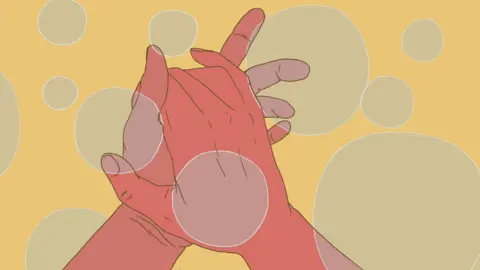OCD: More people seek help during pandemic, charities say
 Emma Russell
Emma RussellThe number of people seeking help for Obsessive Compulsive Disorder (OCD) has risen sharply since the coronavirus outbreak, mental health charities said.
OCD Action said it has doubled the support groups it runs to meet an increase in demand.
A survey by the charity Mind suggested 72% of people with OCD reported their mental health worsened in the pandemic.
It added 71% suffered anxiety about getting the virus, compared with 61% of those without OCD.
Mind said people with OCD, eating disorders, PTSD and personality disorders are among those most affected by worsening mental health during lockdown.
One of those is Lynn Corrigan, 58, from Leeds, who is accessing help from the charity.
She said: "It's like, what I was thinking at the beginning was true, germs can kill you.
"At the minute, there are a lot of people helping to stop the germs because they are doing as they are supposed to, but when they stop the world is going to get back to where there are still a lot of germs out there," she said.
She said her routines, including wiping things down before touching them, will have to be increased as she believes other people will become less careful as restrictions ease.
"If I do go out, I have extra cleaning products with me and I'm extra cautious with people," she said.
Olivia Bamber, from OCD Action, said: "We have had to double the amount of groups that we are running and our volunteers are doing extra shifts to try and meet that demand. and we only expect that demand to keep increasing as we ease out of lockdown.
"For a lot of people with OCD it might feel that their fears are very real, and I don't imagine that coming out of lockdown will necessarily mean the end of their worries about the pandemic."
Mind's statistics come from a survey it carried out in May 2020 of 14,421 adults.
Just over half (51%) of those surveyed had used mental health services before and the charity said BAME groups were under-represented in its sample.

What do I need to know about the coronavirus?
- A SIMPLE GUIDE: How do I protect myself?
- AVOIDING CONTACT: The rules on self-isolation and exercise
- HOPE AND LOSS: Your coronavirus stories
- LOOK-UP TOOL: Check cases in your area
- VIDEO: The 20-second hand wash


Follow BBC Yorkshire on Facebook, Twitter and Instagram. Send your story ideas to [email protected] or send video here.
